Latin Americas Radical Left
Latin American Perspectives in the Classroom
Series Editor: Ronald H. Chilcote
Rereading Women in Latin America and the Caribbean: The Political Economy of Gender edited by Jennifer Abbassi and Sheila L. Lutjens
Development in Theory and Practice: Latin American Perspectives edited by Ronald H. Chilcote
Latin Americas Radical Left: Challenges and Complexities of Political Power in the Twenty-first Century edited by Steve Ellner
Venezuela: Hugo Chvez and the Decline of an Exceptional Democracy edited by Steve Ellner and Miguel Tinker Salas
Contemporary Latin American Social and Political Thought: An Anthology edited by Ivn Mrquez
Mayan Lives, Mayan Utopias: The Indigenous Peoples of Chiapas and the Zapatista Rebellion edited by Jan Rus, Rosalva Ada Hernndez, and Shannan L. Mattiace
Latin American Social Movements in the Twenty-first Century: Resistance, Power, and Democracy edited by Richard Stahler-Sholk, Harry E. Vanden, and Glen Kuecker
Transnational Latina/o Communities: Politics, Processes, and Cultures edited by Carlos G. Vlez-Ibez and Anna Sampaio, with Manolo Gonzlez-Estay
Latin Americas Radical Left
Challenges and Complexities of Political Power in the Twenty-first Century
Edited by Steve Ellner
ROWMAN & LITTLEFIELD
Lanham Boulder New York Toronto Plymouth, UK
Published by Rowman & Littlefield
4501 Forbes Boulevard, Suite 200, Lanham, Maryland 20706
www.rowman.com
10 Thornbury Road, Plymouth PL6 7PP, United Kingdom
Copyright 2014 by Rowman & Littlefield
All rights reserved. No part of this book may be reproduced in any form or by any electronic or mechanical means, including information storage and retrieval systems, without written permission from the publisher, except by a reviewer who may quote passages in a review.
British Library Cataloguing in Publication Information Available
Library of Congress Cataloging-in-Publication Data
Latin America's radical Left : challenges and complexities of political power in the twenty-first century / edited by Steve Ellner.
pages cm. -- (Latin American perspectives in the classroom)
Includes bibliographical references and index.
ISBN 978-1-4422-2948-8 (cloth : alkaline paper) -- ISBN 978-1-4422-2949-5 (paperback : alkaline paper) -- ISBN 978-1-4422-2950-1 (electronic)
1. Radicalism--Latin America. 2. New Left--Latin America. 3. Power (Social sciences)--Latin America. 4. Social movements--Latin America. 5. Latin America--Politics and government--21st century. 6. Latin America--Social conditions--21st century. I. Ellner, Steve.
HN110.5.Z9R35 2014
320.53--dc23
2013043658
 TM The paper used in this publication meets the minimum requirements of American National Standard for Information Sciences Permanence of Paper for Printed Library Materials, ANSI/NISO Z39.48-1992.
TM The paper used in this publication meets the minimum requirements of American National Standard for Information Sciences Permanence of Paper for Printed Library Materials, ANSI/NISO Z39.48-1992.
Printed in the United States of America
Foreword
William I. Robinson
The Global Significance of Latin Americas
New Radical Left
What does it mean to attempt revolutionary transformation in the twenty-first century, in this new age of global capitalism, when so many of our familiar points of reference and goalposts have shifted? The challenges of such transformation are daunting. Yet they are all the more urgent as the system spirals into ever deeper crisis. Fundamental transformation of our global society appears a necessity if we are going to survive. We are living through a time of great upheavals, including the very real possibility of collapse as well as the growing threat of repressive social control systems to contain the explosive contradictions of a global capitalism facing deep structural, environmental, and cultural dislocation. The implacable drive for transnational capital to accumulate on a world scale is bringing on an ecological holocaust and endless war. Yet despite the dangers humanity faces, the current interregnum offers opportunities for transformative, emancipatory projects. First, the system has lost its legitimacy for a great many people. Second, neoliberalism appears to be reaching material and ideological exhaustion. Third, the dominant groups worldwide look to be divided and often rudderless. Fourth, the thirdworldization of the First World opens up new opportunities for radical globalized politics, for organic alliances across North and South.
Indeed, since the crisis of global capitalism began in the final years of the twentieth century there seem to have been two waves of global rebellion. The first involved the rise of a global justice movement, the coalescing of numerous popular struggles and resistance movements from around the world into a critical mass in the late 1990s and the formation of the World Social Forum under the banner of Another World Is Possible. This wave reached its crest at the turn of the century and was in part derailed, in part transformed, by the events of September 11, 2001, and the counteroffensive of the transnational elite made possible by those events. The second wave began in the wake of the 2008 financial collapse and spread from 2009 to 2011. Among those flash points that most grabbed international headlines were repeated rounds of mass strikes and mobilizations in the countries of the European Union, most notably in those hardest hit by austerity; uprisings in the Middle East and North Africa; the Occupy Wall Street movement in the United States; the Chilean student movement; ongoing strike waves among Chinese workers; immigrant rights struggles in many countries; and so on.
There is no single conclusion to be reached with regard to the content and direction of the worldwide revolt, which encompasses uprisings ranging from explicitly socialist revolutions in South America, to the well-organized social movements of peasants in the worldwide coalition Via Campesina or the South African shack-dwellers union, to the amorphous anti-capitalism of the anarchist-inspired upheavals in Spain or of the Occupy Wall Street movement, to shifting coalitions of youth, workers, middle-class professionals, and neoliberal technocrats in Egypt or Greece. The key question is whether these global revolts will succeed in altering the political and economic power structures or actually renovate them through combinations of mild reform and cooptation? Or, worse still, will the global police state respond to mass uprisings that do try to transform the social order in favor of the poor majority by imposing twenty-first-century fascism?
This is where the chapters in this volume enter the picture. Anyone who wants to understand the prospects for, and complexities of, transformative projects in this age of global capitalism and crisis will have to look at the experiences of the twenty-first-century Latin American radical left. Now come Steve Ellner and his colleagues, with this timely and insightful collection that helps us navigate the complexities of these experiences. Taken as a whole, these chapters address a number of vital questions as we contemplate the prospects for transformative projects in global society. The global revolt has yet to address the matter of political power. The cases looked at in this collectionVenezuela, Bolivia, and Ecuador in particular, as well as Nicaragua, El Salvador, and Cubawhile a heterodox group, are precisely those countries where the left exercises political power, or at least attempts to push forward a popular project from within the state. There can be no real emancipatory projects without addressing the matter of political power, that is, of the state. And once the left manages to gain some control over the state a set of complications emerges, to which there are no pre-given formulas and no easy answers. The resolution of any one contradiction gives way to new contradictions, for that is the law of dialectics.

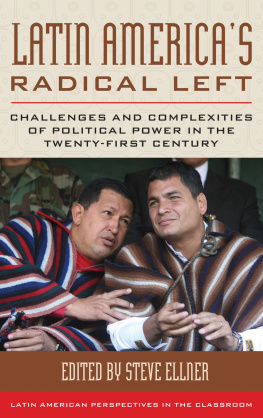


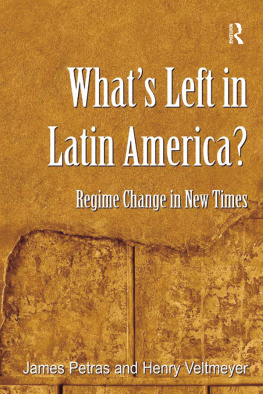

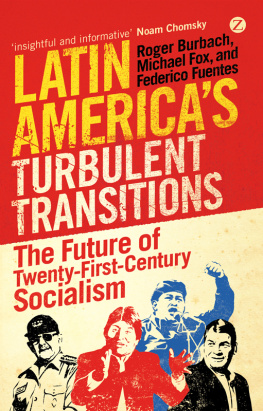
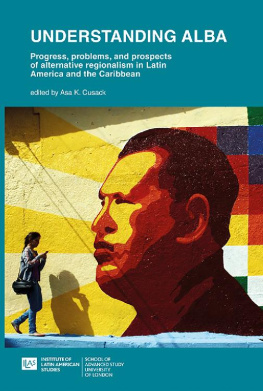


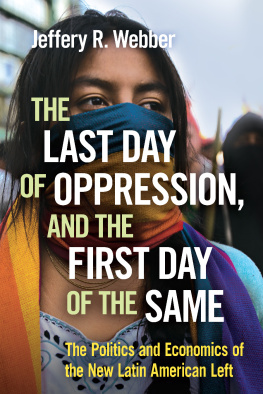

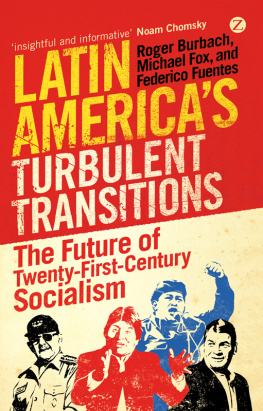

 TM The paper used in this publication meets the minimum requirements of American National Standard for Information Sciences Permanence of Paper for Printed Library Materials, ANSI/NISO Z39.48-1992.
TM The paper used in this publication meets the minimum requirements of American National Standard for Information Sciences Permanence of Paper for Printed Library Materials, ANSI/NISO Z39.48-1992.